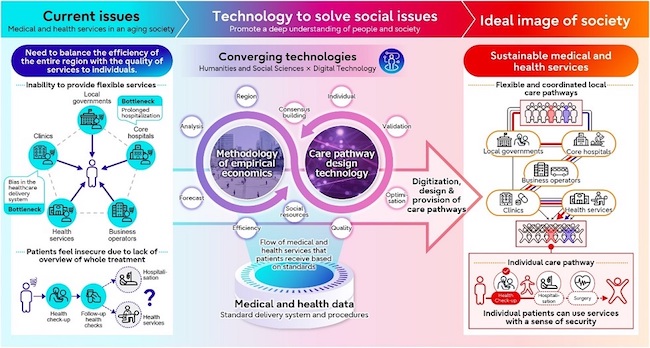
TOKYO, Aug 25, 2022 - (JCN Newswire) - Fujitsu Limited and Tsuda University today announced the launch of a social design joint research project to realize sustainable and flexible community health care services in Japan. The project aims to realize a framework to provide patients with high-quality medical and health services even with limited social resources by leveraging converging technologies: advanced technologies that combine computer sciences including AI with the humanities and social sciences such as empirical economics. The project is scheduled to commence on August 25, 2022.

Image of the joint research
Within this project, Fujitsu and Tsuda University will digitize so-called "care pathways," the flow of medical and health services that patients receive, including disease prevention, treatment, and prognosis. Leveraging Fujitsu's AI technology to predict patients' conditions on the care pathway from medical and health data (1) and Tsuda University's findings from empirical economics (2), the two parties will analyze patients' care pathways and identify bottlenecks in existing regional healthcare systems to ultimately offer patients more efficient and high-quality health services.
With the cooperation of medical institutions and local governments in Japan, the two parties aim to establish a methodology to propose improvements to patients, local governments and service providers, and to build consensus for the practical implementation of these proposals in society.
By the end of FY 2024, Fujitsu aims to connect people with medical institutions, companies, and governments, and apply the sustainable and highly flexible care pathway design technology developed in this joint research to help realize a more consumer-centric industry and society. Fujitsu will further conduct field trials with the goal of applying the newly developed service to a wide range of global medical and health service providers in Japan and beyond. Fujitsu will continue to promote "Healthy Living," one of its key focus areas under its global business brand Fujitsu Uvance, to create a world that enriches the life experience of everyone.
An aging society: growing need for transparent, patient-centered innovation
The rapid aging of society represents an ongoing, urgent social issue in many parts of the industrialized world. In Japan, the ratio of the population aged 65 and over has reached 28.6% in recent years (3). As the aging of society continues to increase in many countries, building a sustainable service provision system that can maintain the quality of medical care and nursing care by efficiently using limited resources is developing into a major societal issue confronting the world.
However, medical and health services, including those relating to disease prevention, treatment, and prognosis, are currently provided as separate services, and comprehensive coordination of these services based on a patient's condition and situation is not yet possible. Due to this lack of coordination, patients, for example, that are transferred between different hospitals, tend to feel insecure as they cannot overview their further treatment. Yet, attempts to improve the quality of medical and health services prove to be problematic, as they require a large amount of social resources and improvements often even lead to a lower efficiency in the provision of services.
Within this project, the two parties will combine Fujitsu's digital technologies including an AI-based technology to predict patient conditions and a matching technology to derive fair assignments with Tsuda University's research findings from empirical economics perspectives, such as health innovation through hospital downsizing (reduction of hospital beds) and urban space realignment (4).
About the joint research
1. Period:
August 25, 2022 - March 31, 2023 (scheduled to continue after April 1, 2023)
2. Research Overview:
Fujitsu and Tsuda University will conduct region-wide analysis of patients' "care pathways" (the flow of medical and health services) based on delivery systems and procedures planned by medical institutions and local governments, in combination with patients' actual medical and health data (receipt information etc.) to identify bottlenecks in current healthcare systems such as regional disparities in delivery systems and prolonged hospitalization.
To identify bottlenecks, Tsuda University will analyze the problem areas by combining its accumulated knowledge in empirical economics with Fujitsu's AI technology to predict patients' conditions on the care pathway from medical and health data.
To reduce the identified bottlenecks, Fujitsu and Tsuda University aim to improve both the quality of services to patients and the efficiency of service provision throughout the region. To this end, the two parties will develop a care pathway design technology to improve plans for systems and procedures for providing medical and health services that can resolve issues from the perspective of patients, local governments, and service providers in the region.
To realize practical application of improvement plans for medical and health service provision systems and procedures, Fujitsu and Tsuda University will cooperate with medical institutions and local governments to establish a methodology for consensus building through solution proposals based on empirical economics.
3. Roles and responsibilities:
Fujitsu
- Centralized visualization of patients' individual care pathways across the region and identification of bottlenecks
- Development of technology to design improvement plans for care pathways based on medical and health data
Tsuda University
- Visualization of diseases and medical indicators such as physical functions and cost-effectiveness based on medical and health data
- Proposal of policies related to regional healthcare delivery systems and setting up of forums for discussion toward consensus building
- Analysis of methodologies for a balanced downsizing of healthcare facilities (reduction of hospital beds) and improvement of therapeutic efficacy
Future Plans
As part of this joint research, Fujitsu and Tsuda University will conduct verification tests using medical and health data in cooperation with Yamagata University (5) and other organizations, including hospitalization records and outpatient medical records in Japan's Yamagata Prefecture, which is promoting the establishment of a community-based healthcare system. Fujitsu and Tsuda University will apply the results of their joint research to communal heath institutes in the Yamagata Prefecture and other regions to verify the effectiveness of their newly developed system.
(1) Medical and health data: Data from the DPC system ("Diagnosis Procedure Combination data", information collected and managed by the Japanese Ministry of Health, Labour and Welfare pursuant to the provisions of Paragraph 5 (iii) of the "Calculation method for the amount of expenses required for medical treatment in wards of hospitals designated by the Japanese Minister of Health, Labour and Welfare") and the KDB system ("Kokuho Database" - "The National Health Insurance Database of Japan") is used to create statistical information from benefit information (medical checkups, medical care, and nursing care) managed by the Japan Health Insurance Association through various operations, as well as data on patient health entrusted by insurers. Both data types are encrypted so that patients cannot be identified.
(2) Empirical economics: An approach to economic methodology that considers empirical analysis based on economic theory.
(3) The ratio of the population aged 65 and over has reached 28.6% in recent years: Statistics Bureau of Japan, News Bulletin December 28, 2021
(4) Health innovation through hospital downsizing (reduction of hospital beds) and urban space realignment: By reducing hospital beds, the number of personnel will be increased to provide more intensive services to each patient. The goal is to improve health by providing comprehensive services to patients in the non-occupied space of the hospital (Research representative: Yukiko Ito, Professor, Department of Policy Studies, Tsuda University).
https://www.jst.go.jp/ristex/stipolicy/project/project30.html (in Japanese)
(5) Yamagata University:
Main campus: Yamagata City, Yamagata Prefecture; President: Hidetoshi Tamate.
About Fujitsu
Fujitsu's purpose is to make the world more sustainable by building trust in society through innovation. As the digital transformation partner of choice for customers in over 100 countries, our 124,000 employees work to resolve some of the greatest challenges facing humanity. Our range of services and solutions draw on five key technologies: Computing, Networks, AI, Data & Security, and Converging Technologies, which we bring together to deliver sustainability transformation. Fujitsu Limited (TSE:6702) reported consolidated revenues of 3.6 trillion yen (US$32 billion) for the fiscal year ended March 31, 2022 and remains the top digital services company in Japan by market share. Find out more: www.fujitsu.com.
About Tsuda University
Tsuda University is a private institution of higher education for women, with a history of more than 120 years since its founding. It has two colleges and the Graduate School, which are now located on two campuses in Tokyo. Since its foundation, Tsuda University has cultivated women who demonstrate leadership with their practical expertise and analytical insights grounded in solid and wide-ranging knowledge. Tsuda University has also earned an excellent reputation for producing distinguished alumnae who have contributed to society locally as well as internationally in various fields.
Find out more: https://www.tsuda.ac.jp/en/.
Copyright 2022 JCN Newswire. All rights reserved. www.jcnnewswire.com